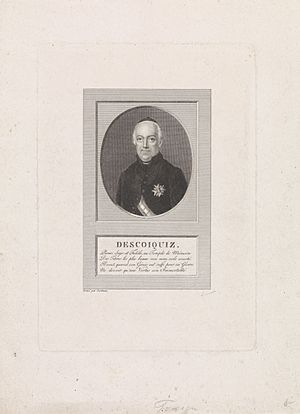Juan Escoiquiz facts for kids
Juan Escoiquiz Morata (1762 – 1820) was an important Spanish figure. He was a churchman, a politician, and a writer. Juan was born in Ocaña in 1762. His father was a general. Juan started his career as a page in the court of King Charles III. Later, he joined the church. He received a special church position in Zaragoza. Some people, like Manuel de Godoy, said Juan tried to get ahead by flattering powerful people. This seems to be true. He was chosen to be the teacher, or tutor, for the future king, Ferdinand VII. This shows he worked hard to gain favor with the people in power.
Contents
Early Life and Writings
Juan Escoiquiz was born in 1762. His father was a military general. Young Juan began his life working as a page for King Charles III. A page was a young helper in the royal court. Later, Juan decided to join the church. He was given a special church role in Zaragoza.
In 1797, Juan published a translation of a book called Night Thoughts. This book was originally written by Young. In 1798, he also published a long poem. It was about the Spanish conquest of Mexico. Juan was a busy writer. He was part of a group of writers who admired Godoy.
Tutor to Prince Ferdinand
Juan Escoiquiz's role as tutor to Prince Ferdinand was very important. This position made him very ambitious. He hoped to become a powerful church leader. Such leaders often had a big say in how Spain was governed.
As Ferdinand grew up, he started to disagree with Godoy. Godoy wanted Spain to be allies with France. Ferdinand and his new wife, a princess from Naples, did not agree. Escoiquiz became the main thinker behind this group. They were against Godoy's plans.
Exile and Continued Influence
Juan Escoiquiz was so active in this opposition that he was sent away from the court. This is called exile. He was given a church position in Toledo. But this did not stop him. Toledo is close to Madrid. So, Escoiquiz continued to talk with Prince Ferdinand. They kept in touch through letters.
He played a big part in a secret plan. This plan was discovered on October 28, 1807. It was known as the conspiracy of the Escorial. Juan was put in prison and faced a trial. But the conspirators had asked Napoleon for help. The government did not want Napoleon's name mentioned. So, the prisoners were set free.
Role in Political Changes
After a big event in Aranjuez on March 17, 1808, Juan became a trusted advisor to Ferdinand. This event led to Ferdinand becoming king. Juan greatly influenced the new king's decision. He convinced Ferdinand to go meet Napoleon in Bayonne.
In 1814, Escoiquiz published a book in Madrid. It was called Idea Sencilla de las razones que motivaron el viage del Rey Fernando VII a Bayona. This means "An Honest Account of the Reasons for King Ferdinand VII's Journey to Bayonne." This book is a valuable historical record. It includes a very clear description of his meeting with Napoleon.
Escoiquiz believed he was very clever. He did not hide his own mistakes or the foolishness of his friends. He showed his own pride and silliness. But he did it with some skill in writing. When the Spanish royal family was held by Napoleon, Escoiquiz stayed with Ferdinand. This was in Valençay. In 1813, he published a translation of John Milton's famous poem, Paradise Lost.
Later Life and Death
When Ferdinand was set free in 1814, Juan Escoiquiz returned to Madrid. He hoped to get a powerful job. But the king was tired of him. Ferdinand also did not want to be controlled by any favorite. After a very short time in office in 1815, Juan was sent to Murcia as a prisoner.
He was later called back. But then he was exiled again to Ronda. Juan Escoiquiz died in Ronda on November 27, 1820.
Honors and Positions
Honors
- Knight Grand Cross of the Order of Charles III.
- Cross of Distinction of El Escorial.
- Cross of Distinction of Valençay.
Positions Held
- Councilor of State.
- Archdeacon of Talavera (a church leader).
- Dignity of the cathedral of Toledo (a high church position).
- Canon of the cathedral of Zaragoza (another church role).
- Chief Librarian of His Majesty (head of the king's library).
See also
 In Spanish: Juan Escóiquiz para niños
In Spanish: Juan Escóiquiz para niños
 | Sharif Bey |
 | Hale Woodruff |
 | Richmond Barthé |
 | Purvis Young |


